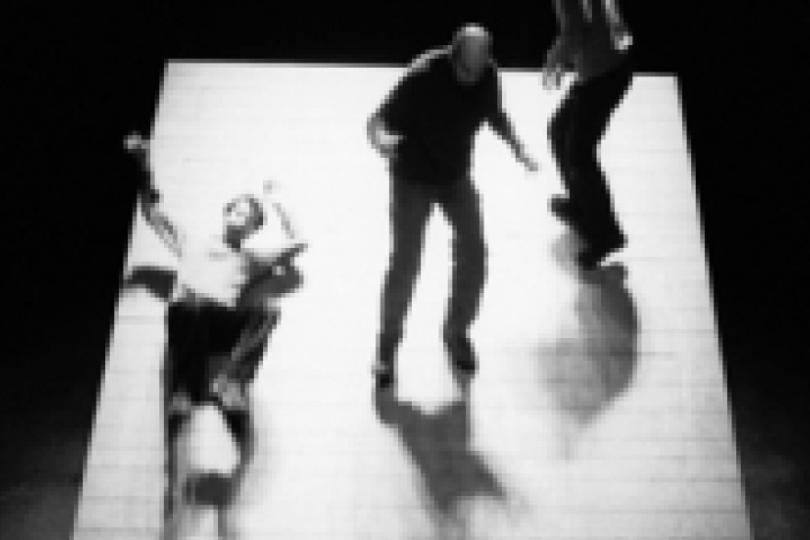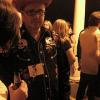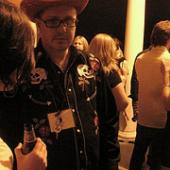This is going to be an odd thing for me to say as a playwright, but at times I dislike scripts. And I’ve worked as a performer in the past, and found I prefer the first rehearsal to the final performance. As a critic, I often enjoy sitting in on the process of making a play more than I enjoy the final product. But, then, I also prefer the way a building looks before it is finished, when its structure is exposed. There’s something about the process of making things that I find very exciting, and I always feel that it’s a bit of a pity that the way we typically do theater masks that process.
This approach, at its worst, feels to me like the creation of a waxworks exhibit. The big questions of a play have been fully explored and settled, and, if the audience is to see anything new being investigated or discovered, it will be something small or finely nuanced. A play will change during its run, yes, but I have found that these changes tend to reflect a growing steadiness, an increasing certainty about what the dialogue is, how it should be said, and how the character feels about the lines they are saying.
There are a lot of forms of theater where this is probably the best approach. Naturalistic plays, as an example, are not really intended to tip their hats that they are plays. It’s for the best to hide the process of making the play, because the whole point is to pretend that it isn’t a play at all, but instead we are miraculously looking through an invisible wall at a group of people who are perfectly unaware they are actors at a theater.
And even with forms that predate Naturalism, it’s probably for the best to approach it as it’s often been approached -- set dialogue, rigorous rehearsals, unwavering blocking, etc. But it’s not the only approach, and I’d like to explore some examples of performance that are thoroughly unsettled. And let me begin by explaining, quickly, why I enjoy this sort of performance.
Every night a different show
Firstly, and most of all, I think one of the real and distinct pleasures of live performance is that every single night you see it, you will see a performance that will never be replicated. This makes live performance significantly different from, say, film or television, where a rerun of an episode will be identical to one broadcast previously. Gathering a small group of people together to share an experience that is unique and cannot be repeated generates an enormous intimacy, a sense of being part of small group that is experiencing a shared event, and one that won’t be experienced in precisely the same way again. This is something that theater does as a matter of course, but mass mediums rarely attempt, and I think it is occasionally valuable to highlight this fact.
Secondly, for my tastes, one of the real pleasures of art is the act of discovery. But each step of the process of creating a play tends to remove more and more discoveries. The actors go from being introduced to their dialogue to memorizing it. They go from developing their characters to setting their characters. Certain themes in the text become highlighted, other themes get pushed to the background. A blank stage that still contains the possibility of becoming anything becomes a set, and suddenly, in place of possibility, we have a specific environment. The way most modern theater is created, if the actors are still having big discoveries on the night the play opens, the play might be in trouble. And, for many plays, this is as it should be. The audience still gets to discover the play for themselves, and a really good performer can believably mimic the experience of discovery right along with the audience. That is what most plays are nowadays -- actors pretending to experience the play for the very first time.
We all discover the play together
But it is possible to create structures in which the cast and the audience share the experience of discovery, either for part of the play or for the entire thing. There’s a theater troupe called the
Improbable Theatre Company, who have been to town a few times thanks to the Walker Art Center. They’re probably best-known for their work on the musical
“Shockheaded Peter,” which was created, in part, using improvisation, but quickly settled into a play that could be duplicated from night to night. However, they have done other work that is considerably less settled, including a piece called “Spirit,” which played here about eight years ago. A certain amount of the story was preset, telling the tale of three brothers and a war. But the play’s three cast members structured the story in such a way that it could constantly be interrupted, and often was, by the cast having actual conflicts with each other, and then finding ways to resolve those conflicts. They’re also responsible for a show called “Lifegame,” which sought to create an entire play out of the experiences of an audience member, who was interviewed onstage. The play was improvised around the details the audience member shared during the interview, and then, as I recall it, ended with the company imagining the death of the audience member.
Another theater troupe,
Gob Squad, likewise creates plays out of structured improvisations. The Walker brought their play
“Super Night Shot” to Minneapolis a few years ago, which was a rather dazzling exercise in creating a story on the spot. The play’s cast members took the roles of a filmmaking team, and, an hour before the scheduled showtime, went out into the streets with cameras and a few set tasks. They were to publicize the movie, scout locations, find a love interest, and end with an onscreen kiss. At the end of this, they were rushed to the performance venue, past the audience, who were given noisemakers and streamers and told to cheer their entrance. Then, in the theater, they edited together all of the footage on the fly, revealing the movie they had just created. Gob Squad will be back in town this week, performing a show called
“Kitchen” that sounds as though it is similarly unsettled. Inspired by a short film by Andy Warhol, also called “Kitchen,” except that the cast has never actually seen the film. Instead, they spontaneously attempt to recreate the film, based on the little they know about it, what they know about Warhol, what they know about the cast, and what they know about the ‘60s. (I should mention, quickly, that have also written a play based on “Kitchen,” titled “chelsea (from a to b and back again),” that was produced by Omaha’s Blue Barn Theatre just under a decade ago.)
Unmoored theater
It is also possible to take a fully scripted play and knock it off its moorings, as it were, so that no two performances will ever be alike, and the play changes significantly from night to night. The best example of this that I know of is a play called “The Race of the Ark Tattoo,” written by W. David Hancock; it enjoyed an excellent production here by Joel Sass’s old company, Mary Worth. The play takes the form of a flea market, and every item on sale has a story associated with it, all from the life of a former foster child named P. Foster. The stories are told in the order that the items are assembled, and they reveal -- and conceal -- a longer narrative. Some nights one part of the story will be told, based on the chosen items, and another it will be different items and a different part of the story.
Although she’s primarily identified with improvised comedy, rather than traditional theater, Jill Bernard’s show
“Drum Machine” is a piece with the plays I’ve described, in that she improvises a fairly complete musical on the spot. Bernard will also take time to explain what she’s doing, when appropriate: I saw one performance when she gave a Chinese character a New York accent, and explained her reasoning to the audience. Specifically, she felt it was impossible for her to do a Chinese accent without sounding racist. It’s not often shows actually stop themselves during their performance to explain how they are made and the reasoning behind these decisions; in this context, it was delightful.
Of course, shows will sometimes become unsettled by accident: A line will be flubbed, or there will be some accident onstage, and suddenly the cast will find themselves winging it. And, with unexpected frequency, these moments don’t hurt a show, but suddenly send an electric charge through it. In other shows, certain bits of stage business will take on a life of their own, finding themselves expanding and getting revised every single evening; this is especially common in comedies. In their way, it’s these moments that make live theater genuinely live. We’re no longer seeing actors mostly duplicating what they’ve done the previous performance and the performance before that. We’re seeing them do something they’ve never done before. I know things like this throw some people into an absolute panic, and those people might be the ones who should stick to a more settled way of creating live performance. For most tastes, these moments are some of the most exciting I have experienced as an audience member, or as a performer. I’d like to see more plays that use these as a starting point, rather than something to avoid.





